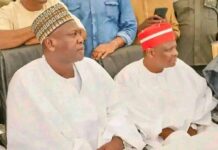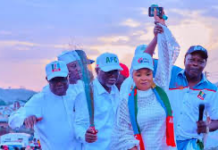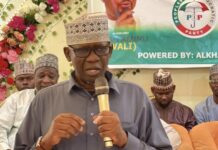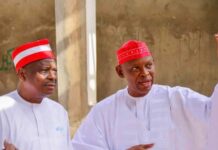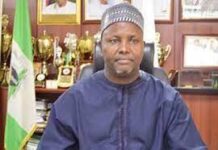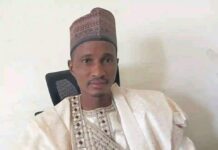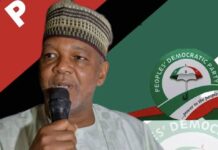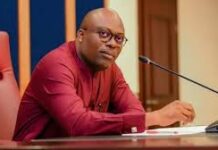Review of a book, Otoge, the triump of hope and progress
By Abdulrazaq Hamzat
1. The book, Otoge: The Triumph of hope and progress started on a blast, with succinct analysis of events and personalities that led to the political victory of the people’s revolution against saraki dynasty, which produced Governor Abdulrahman Abdulrazaq as the governor of Kwara State.
The author of the book, Abdulkadir Babafila mapped out strategic actions and inactions that shaped what Kwara State eventually became today.
2. In an effort to convince the reader of the rightness of his narrative, the author reeled out historic facts about the establishment of Kwara State and the political developments, leading to the establishment, exploit and eventual defeat of the Saraki dynasty.
The book would no doubt give readers some refreshing perspective about what created and uncreate the saraki dynasty that was defeated and swept away in 2019 by the otoge political revolution.
What the author is literally saying is that, the Ilorin emirate elites contributed largely to the creation of the Saraki dynasty.
He believes Saraki dynasty didn’t emerge on its own, it was created by Ilorin elite, who are desirous of having a political figure that would advance their interest in a different manner from what was obtainable at the time.
Who are the elites that created Saraki dynasty? Why did they create it and did it achieve the purpose of its creation?
All of these were properly explained in chapter 3 of the book.
3. The introduction of the 11 chapter book gave a good summary of what is to be expected in the most coherent manner.
However, as interesting as the introduction is, one observable omission is the fact that the introduction didn’t make sufficient reference to critical events of 2007, a transition period after the death of Late Governor Muhammaed Alabi Lawal and the elevation of Mr Gbenga Olawepo Hashim as a frontline crusader for Kwara liberation, before jumping to 2011, where Barrister Dele Belgore (SAN) played a leading role.
Although, the author explained how certain elements from Democratic People’s Party (DPP) and others decamped to the ACN ahead of 2011 election, he didn’t make much reference to what led to the establishment of DPP, who and who played major role in it and what DPP achieved at its peak. This is significant because, Gbenga Olawepo-Hashim’s DPP were the first to drag Saraki to election tribunal for rigging. They also brought in many new and young people into the political space in 2007, some of whom went on to become major players in the movement that eventually uprooted the Saraki dynasty.
4. Chapter 4 of the book, titled like father like son is a narrative of abuse of state patrimony by the saraki dynasty, deliberate mortgage of common wealth and outright stealing. This is apart from other chapters that focused on other controversial incidences during the lifetime of the dynasty.
While chapter 5 focused on saraki’s ability to manover his ways out of difficult political situations, chapter 6 on the other hand established how the saraki dynasty pushed the people of Kwara to the wall, leading to mass revolt.
Read Also:
5. The book talked about contributory factors to the success of Otoge in chapter 7 and 8 and most issues were adequately captured, like the role of the independent radio stations and talk show analysis. However, one observable omission is the significant role of the new media. I am of the view that, speaking about the success of otoge without aknowledging the role of the new media is no doubt an ommission, because most of the radio content are shaped largely by contents and analysis from the new media. Similarly, the contribution of independent pro-democracy groups and civil society organizations were not properly captured in the book, which I think could have enriched the book. Many top players including the Kwara State Governor had at different times, mentioned contribution of various sectors, including the independent youth groups and cso.
Adding those factors would have made the book much more comprehensive, because that is where groups like ‘’Kwara Must Change’’ played a prominent role.
Nonetheless, the observed ommission doesn’t make the book less seminal, a historic narrative of an important event in the evolution of Kwara State.
6. The book also captured some heart touching narrative of Barrister Dele Belgore and Mr Gbenga Olawepo-Hashim, when both men are being accused of running away after the election.
While Mr Hashim explained how he escaped from Kwara in 2007 due to life threatening situations, including assassination attempt, multiple poison incidences and criminal frame up, Dele Belgore on the other explained the hardship he suffered when he was falsely charged for embezzling campaign funds in 2015 and incarcerated for that purpose before his eventual vindication.
Despite sacrificing alot and going through so much pain in the quest for liberation, both men were still being accused of abandoning their supporters after the election, a misrepresentation that is far from the truth. The story of Gbenga Olawepo-Hashim and Dele Belgore were captured on chapter 8 of the book.
7. One beautiful part of the book is chapter 9, where it gave due recognition to what it described as ‘’unsong heroes’’. Many names you probably haven’t heard about, but contributed hugely to the success of Otoge were mentioned and given due recognition. I won’t mention those names here, you have to get a copy of the book.
Some of those names have been on the Otoge struggle, while many who arrogate the success of the struggle to themselves today were even held up within the Saraki dynasty and it is good that this author is giving credit to those who truly deserve it.
8. Governor Abdulrahman Abdulrazaq is a central figure in this book. But more than the governor himself, the role of the Abdulrazaq’s family as a whole was prominently featured, starting from Alhaji AGF Abdulrazaq, to Dr Alimi Abdulrazaq, Senator Khaira Gwadabe Abdulrazaq and Abdulrahman Abdulrazaq himself. The author concluded that Governor Abdulrahman Abdulrazaq is indeed a worthy beneficiary of a progressive struggle he and his family have been a leading light.
9. Another central character in the book is Barrister Dele Belgore, who was the runner up in the 2011 general election. The author gave good account of a struggle he was a part of, through association with Dele Belgore. Actually, this book can be described as a book to tell the story of Dele Belgore’s exploit in the political arena, which is one of the first to do so, in such a comprehensive manner. I think Dele Belgore and all those who were part of his team would see themselves in this book in a positive way, like never before.
10. The concluding part of the book talked about the changing face of kwara and the determination of the present administration to build a solid foundation for future progress. While the author threw some jabs at certain individuals who couldn’t see the vision and ongoing reforms in the state, he also called for vigilance to ensure the administration stay true to it’s vision.
In all, the book, Otoge: the triumph of hope and progress, written by Abdulkadir Babafila, is a refreshing perspective that gave due regard to most people, who brought Otoge political revolution to reality.








